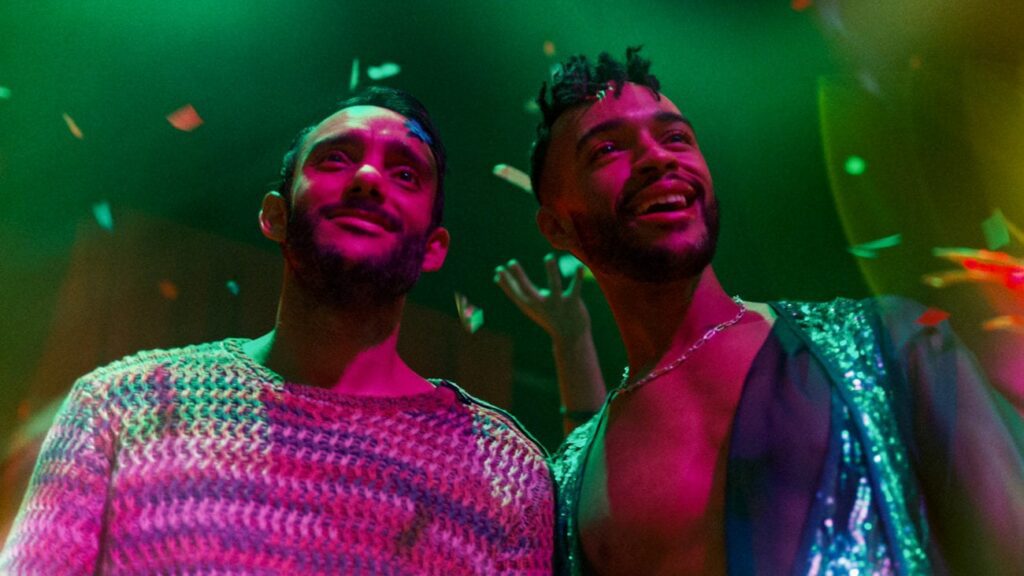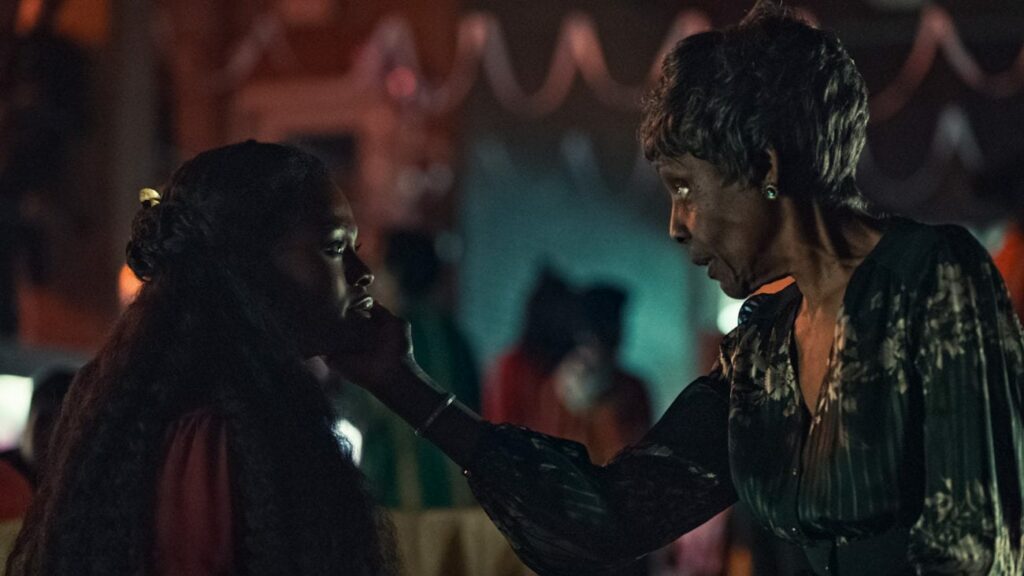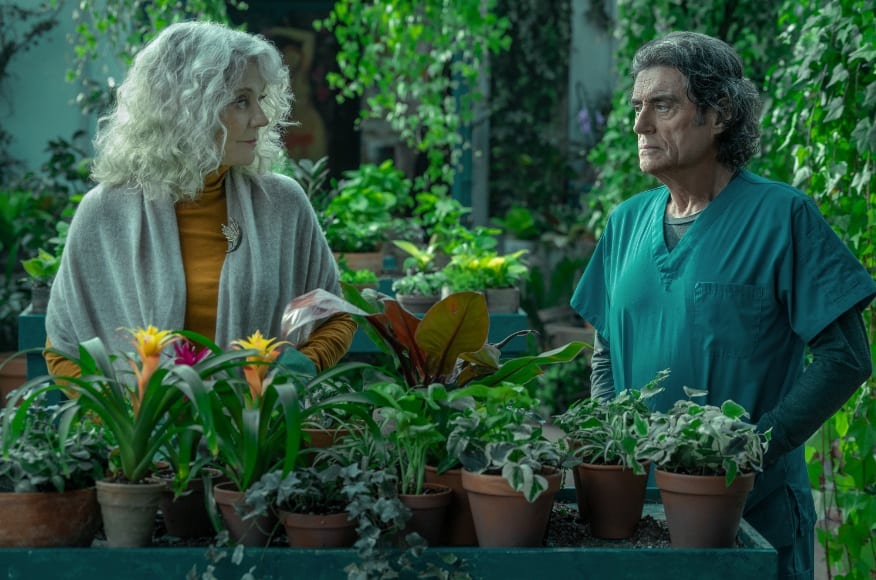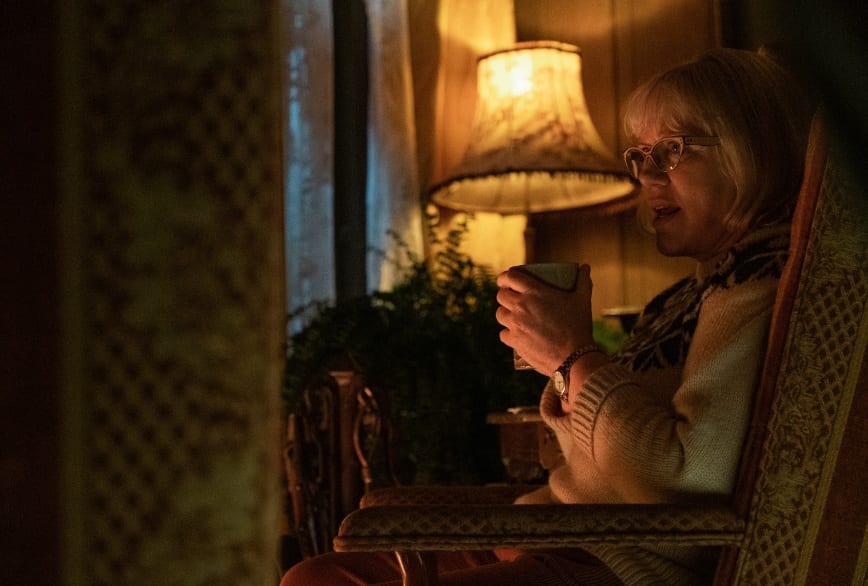Reflecting on Season 3 of American Gods, creator Neil Gaiman said that the show is “very, very much back in the book”, and it definitely felt that way. A couple of major plot reveals from the novel have now been incorporated, leaving the show hinging on a drastic cliffhanger. There’s been a heavy focus on personal identity for many of the characters, such as Shadow, Laura, and Bilquis: going back to their roots, finding out who they truly are and what their purpose is. All this has made way for compelling viewing throughout the season, even with bumps along the way—there’s a lot to pick up from where we last left off.
After Laura and Salim paired up, the former led the journey to kill Wednesday, the latter being a rather lost and reluctant acquaintance. Salim accompanies Laura in making a deal with Mr World; she will kill Wednesday for the New Gods to avoid instigating a war. Not long after, Laura and Salim part ways in ‘The Rapture of Burning’, one of the most significant episodes of the season. At the Grand Peacock Inn, Laura finds leprechaun Liam Doyle (Iwan Rheon), who she recruits to help her get a spear to kill Wednesday. While this is going on, Salim has a life-changing experience in relation to his sexuality.
To backtrack a little here, the origin of the Grand Peacock Inn starts in 1951. Toni Rykener (Dana Aliya Levinson) is working the front desk of the hotel when Tu’er Shen (Daniel Jun), the Chinese god of gay love, comes in seeking shelter from the police. His power has been diminished as the result of centuries of homophobia in America. Without realising who Tu’er Shen is, but connecting the dots and realising the man is gay, Toni, a trans woman, risks her own life by protecting him. As a reward, Tu’er Shen grants her immortality and blesses the Grand Peacock Inn as a temple dedicated to queer love. Dana Aliya Levinson said the following about the scene:
“To me, that whole concept is just radical and revolutionary. To show a queer person who’s not a queer deity, necessarily, but just a run-of-the-mill queer person being granted a long and fulfilling life—it just felt like a visceral release in the moment that line was set.”
When Salim arrives at the hotel, he is hesitant about participating in sex with other men, especially since he isn’t fully over the Djinn yet. However, with encouragement from both Laura and Toni, Salim eventually enters the sex party at the hotel and hooks up with Kai. The lingering scene has the camera moving through the orgy, painting an honest and celebratory picture of the event. There’s always a fine line to tread in not implying hypersexualisation or kinks are synonymous with queer identity; above all else, the scene ultimately unfurls as a framing of queer joy and liberation, free from objectification and the straight, cis gaze. Trans and queer bodies simply exist in this scene, without fetishisation from the camera. Salim is also able to be with Kai in a relatively closed-off area so he feels comfortable, and there is a focus on explicit consent between the two men during sex.
As well as causing him to let go of the Djinn, Salim’s experience negates any shame surrounding his sexuality, and helps him to fully embrace what “God has to offer”. In the aftermath, he also fully regains his faith as a Muslim, as we see him pray with his previous invigoration. What I love most about Salim’s portrayal is that his sexuality and faith run parallel, not opposite, each empowering the other. He stays at the hotel for safety and we don’t see him in the finale—it does feel a bit like the writers don’t quite know what to do with Salim past him being gay and Muslim. I’ve loved the commentary regarding his character, but he sometimes feels like just that, without being given major plot significance.

‘The Rapture of Burning’ also saw Laura properly let go of Mad Sweeney by scattering his ashes. Just as she thinks Doyle has betrayed her, taking the lucky coin to enter Sweeney’s hoard, he returns with Gungnir. He later trains her in using the spear before she confronts Wednesday, and their moments together really showcase Laura’s character development across the season. Realising she might die tomorrow, Laura propositions Doyle for sex, then backtracks, saying: “I used to do this a lot. I would find someone to have sex with when I was anxious or bored. And it’s not…it’s not good.” Her self-awareness and reflection on past unhealthy decisions show how she’s changed and is now willing to reign in her impulsivity, making choices that are better for herself.
In an extremely dramatic scene at the end of ‘The Lake Effect’, Laura really does go through with killing Wednesday. Doyle is sadly killed by Czernobog, essentially sacrificing himself by throwing the lucky coin to Laura for a guaranteed hit. I can’t deny my respect for Laura for setting up such a lofty ambition and then actually succeeding (even though it was irritatingly orchestrated by Wednesday, but I’ll get to that). Shadow is supposed to kill her in the finale, in line with Norse traditions of avenging his father’s killer, but he elects not to. Their final conversation has some nice nuance to it, as Laura makes a valid point about Wednesday only ever making Shadow’s life miserable, and how his plan to be a leader now is just following in his footsteps so he isn’t free from his iron grip. Although her motivation for killing Wednesday was entirely selfish—which she admits—she does care for Shadow in some capacity and wanted to give him genuine advice. A brief set-up at the end involving Bilquis finding her implies that Laura could be Shadow’s soulmate. I’m interested to see how this would pan out if we get a Season 4.
On the topic of Bilquis, since breaking free and reclaiming her power, she has still been navigating her purpose. Following some visions, she tracked down a mysterious woman who turned out to be Eugenia, the midwife to Shadow’s mother. When Bilquis initially introduces herself to Eugenia at a party, the woman rejects her, assuming she’s there to take her to the afterlife since she’s ill. Bilquis and Oshun (one of the Orisha) then dance together, allowing Eugenia to see her for the goddess she is. She informs Bilquis that Shadow needs help from her; in ‘Tears of the Wrath-Bearing Tree’, we see Eugenia tell Bilquis to find Shadow’s “Other”, his “soulmate”, because he needs to be whole in order to lead people. Ending on her locating Laura, all logic points towards the confirmation that Laura is Shadow’s soulmate.
The ‘soulmate’ concept is rather jarring, and I’m hoping that I’m somehow misinterpreting the teeing up of Shadow and Laura as soulmates. It would almost feel like a betrayal of both of their characters, plus the idea is just a bit weak. Most of Bilquis’ scenes this season have revolved around her finding herself, receiving guidance from the Orisha and Eugenia, and embarking on some sort of quest regarding Shadow. However, by the end of Season 3, we’re not all that much wiser to the point of it all. Bilquis still feels aimless somehow—after a very intentional focus on rediscovering her identity as a Black god, there feels to be a shift back to some uncertainty with her narrative. Now, she seems to be serving Shadow entirely, and I’m not sensing as much of that succinct direction they really set up for her around Episode 5.

Technical Boy also has an anti-climactic resurgence towards the end of the season. Due to his glitching, Mr World ironically traps him inside one of his own virtual reality face-hugger-type boxes so he doesn’t have to worry about him messing things up for him. On the surface, it seems like a foolish choice for Mr World to trap Tech Boy inside technology, since he can hack his way out, but it becomes apparent later that this was likely his intention. While inside the box, Tech Boy suffers an identity crisis similar to that of Bilquis when she was imprisoned earlier in the season—Yetide Badaki-as-Bilquis-as-Tech Boy actually appears as the personification of his own mind questioning himself, with a brilliant performance.
Once he escapes, Tech Boy slaughters Mr World’s faceless bodyguards throughout the New Gods’ headquarters in the search for ‘Artifact 1’. He finds the object in the basement, in the form of a small rock. Touching it, Tech Boy sees flashes of images of the world’s most significant technological inventions, such as printing, electricity, and nuclear weapons. This is where it takes a turn. Mr World enters the room, and after trapping him, explains that Tech Boy is the most powerful god of all, since he bridges the gap between the Old and New Gods. He is the very embodiment of human innovation, but there’s a catch: as human technology evolves, so does Tech Boy, causing him to forget who he is each time.
But there’s someone else who isn’t exactly who we thought he was: Mr World himself. He’s not been much of a focus throughout the season, instead pulling the strings from behind the scenes. He hired Laura to kill Wednesday to avoid inciting a war, giving her instructions on how to kill him and arranging a “peace talk” to get him to the correct location. We also see him swap faces rather a lot, from Crispin Glover to Dominique Jackson to Danny Trejo (and back and forth multiple times), playing up to the theme of identity. Nothing has so far become of the Shard project that was mentioned in the first episode and a couple more times throughout the season, which has made it feel irrelevant.
The application supposedly represents the next development in human technology, and with Tech Boy now trapped, Mr World will presumably use him to develop it. It’s quite disappointing that they’ve not done anything with the idea, especially since it was set up from the start of the season, but it seems to be more of a lead into the not-yet-confirmed Season 4. Plus, Mr World hints in his final scene at being some sort of trickster god by saying to Tech Boy, “trickery is what I do best”, while avoiding the question of who he actually is. Another exciting set-up, should Season 4 get the green light.
How about our main god, Wednesday/Odin? He’s been rather busy this season, attempting to gather up his fellow Old Gods for war as usual, but with some extra curveballs thrown in this time. After suspecting Johan, Wednesday discovered that Tyr (Denis O’Hare) was actually the berserker killing his followers, which led to a pretty epic fight between them. Considering their shared past, I’m surprised Wednesday didn’t suspect Tyr, although he was just underestimating the war god. I mean, he was a dentist, for Gods’ sake, he didn’t seem all that imposing. The plot also tied in with their mutual relationship to Demeter, who used to be with Odin until their child passed away. When Odin grew distant as a result, their relationship fizzled out and Demeter started dating Tyr instead. It was a little frustrating how Demeter’s focus was mostly being in a love triangle with these men, and although Odin was reprimanded by her for how he acted in response to the loss of their child, more attention was placed on how it affected him rather than her. Since Demeter vanished shortly afterwards, the narrative served to represent Odin’s vulnerability, and all-in-all felt rather pointless.

A relationship that was more satisfying this season was Wednesday and Cordelia’s friendship (or boss-employeeship?). Her freakout about discovering he (and pretty much everyone) is a god was necessary, being anticipated from the start, but was a little repetitive due to this happening to both Shadow and Salim in previous seasons. I did however enjoy the angle of Cordelia insisting on continuing her work with Wednesday instead of quitting, since she understandably can’t go back to normal now she’s learned that gods exist. As opposed to the Wednesday-Shadow duo, this friendship was a lot less dysfunctional since the familial aspect is removed, and was really quite wholesome at times. After Wednesday dies, Shadow emphasises to Cordelia that he genuinely cared for her, and she is visibly heartbroken at his passing, saying, “He could be a bastard, but he was a good boss.”
Wednesday’s death scene in ‘The Lake Effect’ was highly dramatic, as mentioned, with the slow-motion movement and a spotlight on both him and Laura. The penultimate-episode cliffhanger was a shock too, even if book fans will have been expecting the event eventually. More than this, though, was the reveal in ‘Tears of the Wrath-Bearing Tree’ that Wednesday orchestrated his death, and Shadow’s sacrifice, to restore his own power. Any of his emotional vulnerability that was highlighted throughout Season 3 is nullified by this extremely manipulative move. It goes to show that a con man can never be trusted. A storm begins to gather at the end, as Wednesday’s body disappears, hinting at his return in physical form.
Onto our leading man, Shadow. The mid-season point left us with Laura arriving in Lakeside, and this didn’t amount to much at all; she just told him that she planned to kill Wednesday, and after he refuses to disclose his location because it’s his dad, she just sort of shrugs and says “he’s gotta go” before leaving. Laura briefly meets Marguerite on her way out, making sure to mention that “he’s a really good guy” with “a good heart”. Shadow and Marguerite do end up dating, but it’s short-lived due to the discovery that her son, Sandy, was murdered by Hinzelmann. It seems Shadow is doomed to be unhappy most of the time.
The Lakeside segment finally comes to its conclusion in ‘The Lake Effect’. As it turned out, the person stealing ladies’ underwear was Derek so he could wear them. He then commits suicide and Alison’s jacket is found in his room, implicating him in the murders before we find out it’s actually Hinzelmann. I have to say, I absolutely hated Derek’s narrative—the idea of stealing ladies’ underwear is a very archaic and negative stereotype of queer and specifically trans people, having connotations of being some kind of pervert. It also doesn’t make much sense; if Derek didn’t want people to know about his clothing preferences or identity (whether or not he’s trans or queer is left ambiguous), then why would he start breaking and entering, ensuring he’ll be found out? It’s uncertain as to whether his suicide was for real, or framed that way by Hinzelmann if she did kill him (I’d assume the latter), but choosing suicide as the way to get rid of a queer- or trans-coded character hit a bit too close to the reality of deaths and tragedies of LGBTQ+ people. It’s a stark contrast against the queer joy represented in ‘The Rapture of Burning’.
Guided by the divine appearance of coins, Shadow discovers that Alison’s body is in the trunk of the car on the frozen lake, causing it to break at the exact moment he predicted earlier in the season. The effect of the dead children’s spirits being released as Shadow falls into the lake was a little cheesy but sweet. He soon wakes up in Hinzelmann’s house, realising she is the killer and also a kobold (a Germanic sprite) in cahoots with Wednesday. Almost every year, she sacrifices a child to preserve the town’s economy. After Chad Mulligan arrives, him and Shadow kill Hinzelmann, her blood turning to fire in a very cool effect, so her house burns down as they leave. Even though the plot has been drawn out across Season 3, its conclusion is quite hasty. Gender-flipping Hinzelmann from the novel also felt unnecessary; Hinzelmann in the novel is already inconspicuous due to his kindness and cheerfulness, so making the character a woman doesn’t emphasise or change this. It did feel as though she was gender-flipped for the sake of it, which is a shame.

Once the Lakeside narrative is all wrapped up, the final episode could be fully dedicated to Wednesday’s death and the consequences that has for Shadow. Upon seeing his body, Shadow says to Cordelia: “He was a selfish dick. He might have believed his intentions were noble, but he never did anything that wasn’t in his own self-interest.” Sadly, he doesn’t even realise the extent to which that’s true. As is customary following the murder of a Norse god, the son is expected to avenge the father, meaning Shadow should kill Laura. He refuses—I never believed for a second he was going to go through with it, and it’s in line with his character. Instead, Shadow opts for the vigil: spending nine days and nights on Yggdrasil, or the World Tree. Aside from loyalty to his dad, Shadow’s reasoning for this was supposedly to “become something more”, because he “crave[s] power”. This struck me as odd, as it seems to oppose his selfless personality and motives, and a desire for power hasn’t really been a part of his journey so far.
Gods can survive this vigil, but it’s basically impossible for mortals; with Shadow being a half-god, it’s uncertain as to whether he will achieve it or not. After some hallucinations and time-lapse shots, Shadow finds himself back on a plane sat across from Wednesday, a parallel of their first scene together. This is where Wednesday reveals his manipulation, admitting he needed a “blood sacrifice by a son” to restore him to his former glory. Hopping off the plane, Wednesday leaves Shadow to die. Ricky Whittle describes the scene as “heartbreaking”:
“He’s never had a father in his whole life, not even a father figure, and then here we have a father who is all-powerful Odin… [Shadow has] truly found a place in this world, and although there’s lots of craziness around him, he’s growing into. He’s realizing that he’s special and that he might have a part to play… and that maybe he’s meant to rule alongside his father. [It’s his] worst nightmare, when you realize that he never loved you and you were never important to him. In fact, you were only there so that he could use you to become even more powerful.”
It truly is the worst possible betrayal of Shadow, especially as he spent the season toeing the line between loyalty and recalcitrance before proving himself with such a colossal sacrifice. It’s a tragic place to finish the season at.
Season 3’s closer accuracy to the novel and integration of more major plot points has made it far more interesting and purposeful than the last season. Although there still has been some dithering with particular characters (Salim and Bilquis, for example), and certain issues with the plot, it’s made me feel something again, which is a definite improvement. If Season 4 doesn’t happen, “we’ve ended on the single most frustrating, upsetting and maddening place that any season could possibly end”, to quote Neil Gaiman. As a Hannibal fan, I supposed I’m prepared for these kinds of situations. But with more reveals from the novel yet to come, I do hope American Gods gets renewed for another season.

